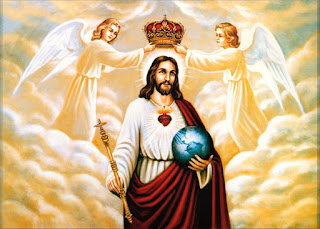Scripture readings for Christmas Day can be found at http://usccb.org/bible/readings/122516-day.cfm
And
the Word became flesh
and made his dwelling among us,
and we saw his glory,
the glory as of the Father’s only Son…
and made his dwelling among us,
and we saw his glory,
the glory as of the Father’s only Son…
Since
the beginning of December everyone has been busy preparing for the
coming of Christmas. Christmas shopping, Christmas decorations,
Christmas parties, Christmas music on the radio since Thanksgiving.
Santa Clause at the end of the Thanksgiving Day parade! All of this
is good, but does it really point to the true meaning of Christmas?
In all this hustle and bustle that we've been dealing with for the
past month are we really centering our selves on the birth of Christ?
Are we truly preparing ourselves for what Christmas really is?
What
we should have been remembering and celebrating during all this past
month of preparation is the birth of Our Lord and Savior Jesus Christ
more than 2,000 years ago. Today we are celebrating the Word becoming
flesh and dwelling among us.
We
can learn from the Old Testament prophets what the true meaning of
Christmas is. They were waiting for the coming of the Messiah for
centuries. During today's First Reading from the Book of Isaiah, he
continues to proclaim that God was coming into the world through
Jesus. Isaiah says, “All the ends of the earth will behold the
salvation of our God.” Jesus is that salvation that Isaiah was
talking about.
We see in Jesus a reflection of the glory of God. Jesus is the very imprint of God's very being. Jesus told his disciples that whoever sees Him, sees the Father.
Jesus, the Son of God, sustains all things by His powerful Word. When He had made the perfect human sacrifice on the cross as the Lamb of God for the remission of the sins of the world, He sat down at the right hand of the Father. His work on earth as Jesus in physical form was completed. Now, in conjunction with the ministry of the Holy Spirit, Jesus is ruling over His spiritual Kingdom in Heaven and on earth.
Baby Jesus came into the world for each and everyone of us, so that we may be saved. Through Jesus, our living faith that is manifested through the Sacraments of the Catholic Church leads us towards the Light of God and the truth as our assurance of salvation and eternal life in the Kingdom of God. Let us never forget this! From the time we rise in the morning to the time we go to bed at night, let us always be thankful to Jesus for manifesting to us the goodness and love of God.
On this Christmas Day let us forget all the hustle and bustle of the past month in preparation for this day. Let us remember that it is the presence of Christ born of the Virgin Mary that we celebrate! Let us, like John the Baptist, point out to others in our lives that Jesus ranks ahead of us, and He should be the center of who we are and what we do. Jesus is the reason for the season!
Today we celebrate that a Child was born for us. As you look at Baby Jesus in the manger, always remember that the fullness of God dwelled in Him. In Jesus was the fullness of the Trinity, the Father, the Son and the Holy Spirit. Those who know Jesus also know the Father for they are One.
Let us, with the angels from on high, say to those in our lives on this Christmas Day, “We proclaim to you good news of great joy that will be for all the people. For today in the city of David a savior has been born for you who is Christ and Lord.”
Merry Christmas!





















